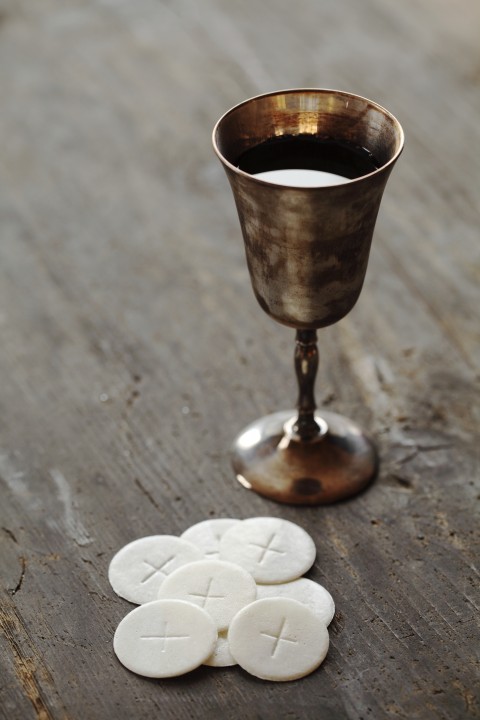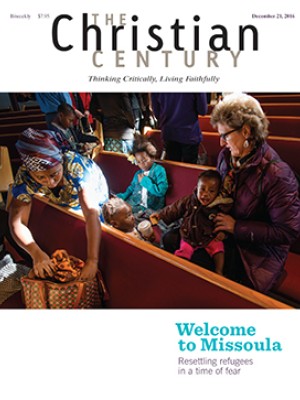Bearing God in Advent
As I lifted the chalice, the baby began to play soccer under my ribs.

The first parish I served was in southern Louisiana. The denomination considered our congregation a “maintenance church.” Basically, it was waiting until the doors closed. Standing in front of the communion table, I felt like a very young woman. I am short, and I swam in my preaching robe and the tassels on the end of my stole dragged on the ground.
The area was stringently Roman Catholic. When I wore my clergy collar, people looked at me with visceral disgust. I once heard someone say, “Look at her. She thinks she’s a priest.”
I struggled, yet somehow the tiny church grew. For the first time in decades, the service filled with the sounds of children singing, talking, and disrupting my sermon. It was wonderful.
After a couple of years, I became pregnant and was terrified to tell the congregation. I, personally, had never seen a pregnant pastor. I had only read about one in a John Irving novel.
During Advent we turned to Mary’s story. She was a poor young woman who found herself pregnant. A messenger came and gave her two important pieces of information: she would bear the son of God, and her cousin Elizabeth was also pregnant, even though she was too old to be giving birth. Nothing was too wonderful for God. Mary responded, “Let it be done according to your word.”
Read our latest issue or browse back issues.
Meister Eckhart, a medieval philosopher and mystic, saw Mary’s assent as a crucial moment. Eckhart wrote that we flow out of God our Creator. God is perpetually creating us; we are living in the mind of God and always being stretched and formed and molded. Mary gives spiritual birth to God, and now God is eternally borne. Every good soul that longs for God bears God and gives birth to God.
I thought about Eckhart’s words as the months went on and my stomach stretched. Then I experienced a moment that forever changed my view of myself as a Christian and of God and salvation. I was in my third trimester, repeating the ancient words of institution during communion, when my belly began shifting around with those smooth oceanic movements. I looked down and even under that giant black robe I could see it moving, transforming into those alien shapes. My baby was just waking up and stretching. I smiled and thought, Oh no. Not now. Please, go back to sleep!
I continued to look down, but this time my eyes searched for the lines in my prayer book, and I began reading the liturgy. I was afraid that I would become so distracted that I would lose my way if I tried to say the words from memory, and so I lifted up the cup and resumed. “This cup is the new covenant sealed in my blood, shed for you for the forgiveness of sins. Whenever you drink it, do this in remembrance of me.”
The movement was no longer a gentle rolling. I felt jabs, right under my rib cage. As I held the cup up, I gasped as the baby began to play soccer with my internal organs. My eyes widened, and I almost spilled the wine as she kicked me, hard. I could barely contain my laughter as I continued: “Every time you eat this bread and drink this cup, you proclaim the saving death of our risen Lord, until he comes.” I stood there breathing deeply while this great and wonderful pain stretched me and transformed me, and with each jolt, a tremendous sense of creative power flooded me.
Suddenly, this thought of Jesus coming again, which had always filled me with anxiety and fear, gave me hope. In that moment, as I spoke of Advent dreams—with Jesus coming again, my belly stretched—and broke the bread and poured the wine, I was filled with joy and longing instead of fear or vengeance. The yearning was deeper than what I’d felt growing up as a child and waiting for Christmas, because it encompassed the pain and sorrows as well as the anticipation, like moving from the taste of a cloying soda to the complex bitterness and sweetness of a fine wine.
The deep yearning was emotional, but it was physical too. I was a pregnant host at that table, and hope came alive in my very marrow as I felt a full-bodied longing. My muscles and bones adjusted in anticipation for the new life that was to come.
I felt at home for the first time in my body and behind that table, as I also understood the longing for Christ to be among us. I understood that it was a hope for the world as it ought to be—one that lifted the lowly and filled the hungry. I knew that just as I longed to provide for the child forming inside of me, God longed to provide for me.
Jesus wasn’t going to arrive on a mushroom cloud with a double-edged sword coming out of his mouth in a kick-ass move of final vengeance. Christ would not appear to bring death and destruction.
Christ returned here in our hope and work to make things on earth as they were in heaven. Christ appeared in our caring for the earth and for one another as we broke bread and drank wine together. Christ came in new life and fecundity. He came again as we served the world, striving to make the earth into the dream of God.
As I delivered the bread and the wine to the congregation, I remembered Mary and those mysterious words of Eckhart. I was blessed. I was pregnant with hope and bursting with new life. And I was bearing God.
A version of this article appears in the December 21 print edition under the title “Pregnant with hope.” It was adapted from Carol Howard Merritt’s book Healing Spiritual Wounds: Reconnecting with a Loving God after Experiencing a Hurtful Church (© 2017 HarperOne, an imprint of HarperCollins Publishers). Used by permission.







